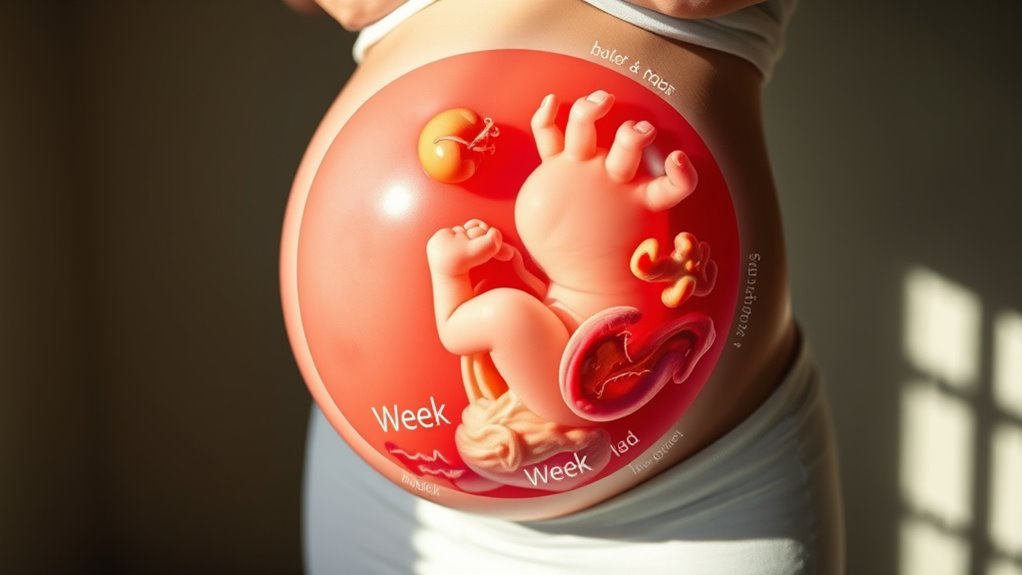Your week-by-week fetal development journey begins soon after conception, as your baby forms essential organs, tissues, and basic body structures. Ultrasounds at 8-12 weeks confirm heartbeat and due date, while ongoing ultrasounds around 18-22 weeks reveal detailed growth and sex if you choose. Proper prenatal nutrition supports this rapid development. Later, ultrasounds check lung maturity and position. Keep exploring to discover how each stage shapes your baby’s growth and what milestones to expect.
Key Takeaways
- Fetal development begins immediately after conception, with vital organs forming in the early weeks.
- Ultrasound milestones, like the 8-12 week dating scan, confirm heartbeat and due date.
- The second trimester ultrasound (18-22 weeks) assesses anatomy, growth, and reveals fetal sex if desired.
- Proper prenatal nutrition supports organ, bone, and tissue development throughout pregnancy.
- Late pregnancy ultrasounds monitor lung maturity, fetal positioning, and identify potential complications for birth readiness.

The journey of fetal development is a fascinating process that begins soon after conception and continues until birth. As you navigate this incredible experience, understanding how your baby grows each week can help you stay informed and engaged. During this time, prenatal nutrition plays a vital role in supporting healthy development. Eating a balanced diet rich in vitamins, minerals, and nutrients ensures your body provides everything your baby needs to grow properly. For example, folic acid is crucial in early weeks to prevent neural tube defects, while calcium supports the development of strong bones and teeth. Staying well-hydrated and avoiding harmful substances like alcohol and excessive caffeine also contribute to a smoother pregnancy journey.
As your pregnancy progresses, ultrasound milestones become key indicators of your baby’s growth and health. Around 8 to 12 weeks, your doctor may perform a dating scan, which confirms your due date and checks for the baby’s heartbeat. This early ultrasound can also detect any potential issues and helps you feel connected to your developing baby. Moving into the second trimester, typically between 18 and 22 weeks, a detailed anatomy scan is usually conducted. This ultrasound provides a comprehensive view of your baby’s organs, limbs, and overall growth, allowing you to see your little one in greater detail. It’s an exciting milestone that often reveals the baby’s sex if you choose to find out.
Throughout your pregnancy, ultrasounds serve as more than just milestones—they’re vital tools to monitor fetal development. They help identify whether your baby is growing at a healthy rate, assess placental placement, and detect any abnormalities early on. Proper prenatal nutrition supports these developmental stages, ensuring your baby’s organs, bones, and tissues develop as they should, which is reflected in the ultrasound images. As you approach the third trimester, ultrasounds become essential for checking lung maturity, positioning, and overall readiness for birth. Additionally, understanding market trends in the industry can offer insights into advancements and innovations that may influence prenatal care and health monitoring options. Recognizing angel number symbolism related to love and spiritual connections can also provide emotional support during pregnancy.
Frequently Asked Questions
How Can I Tell if My Baby Is Developing Normally?
You can tell if your baby is developing normally by paying attention to fetal movement, which typically starts around 18-25 weeks and becomes more regular. Regular ultrasound timing, scheduled by your healthcare provider, helps monitor growth and development. If you notice fewer movements or concerns during ultrasound checks, contact your provider promptly. These signs, combined with routine prenatal care, help guarantee your baby’s development stays on track.
What Are Common Complications During Fetal Development?
Common complications during fetal development include genetic abnormalities, which can cause unexpected issues, and placental problems, disrupting nutrient and oxygen flow. You might notice warning signs like abnormal growth or unusual symptoms. Regular prenatal check-ups help catch concerns early. Staying vigilant, following medical advice, and attending all appointments can help manage these challenges, ensuring your baby develops as healthily as possible despite potential problems.
How Does Maternal Health Affect Fetal Growth?
Maternal health considerably impacts fetal growth. When you experience high maternal stress, it can lead to smaller birth weight and development delays. On the other hand, engaging in prenatal exercise boosts blood flow and nutrients to your baby, promoting healthy growth. Taking care of your mental and physical health during pregnancy helps guarantee your baby develops properly and reduces the risk of complications. Prioritize stress management and safe exercise routines for ideal fetal development.
Are There Specific Nutrients Essential at Each Stage?
You might think you need to focus on just a few nutrients, but each stage of pregnancy requires specific vitamins for ideal fetal growth. Vitamin supplementation and dietary recommendations change as your baby develops, ensuring essential nutrients like folic acid, iron, and calcium support your baby’s growth. By following tailored advice, you can meet these needs at every stage, giving your little one the best start in life.
When Should I Start Prenatal Screenings?
You should start prenatal screenings early, typically around your 10-12 week mark. This is when genetic testing, like NT scans, are usually done, and ultrasound timing is ideal for checking your baby’s development. Your healthcare provider will guide you on additional screenings throughout pregnancy. Starting these tests at the right time helps make certain any concerns are caught early, giving you peace of mind and better preparation for your baby’s arrival.
Conclusion
Now that you’ve seen how your baby develops week by week, it’s incredible to think about the tiny miracles happening inside you. Each stage brings new growth and milestones, reminding you of the amazing journey you’re on. As you look forward to the days ahead, can you imagine just how much your little one will grow and change? Embrace this special time, knowing you’re nurturing a brand-new life with every passing week.









